Environment
GRI 103-1, GRI 103-2, 103-3

Responsible and sustainable financing
GRI 307-1
With the ambitious goal of becoming the leader in sustainable finance by advancing the Green Economy by 2030, the CDB Advance Sustainable Financing vertical was initiated in FY 2020/21. In order to support a green economy and lifestyle, CDB partnered with solar energy suppliers to encourage customers to switch to solar electricity while introducing a financial facility under green financing. This was initiated as a pilot project during the year under review, and owing to its success, we will expand it to the ensuing year.
In our commitment to advancing environmental and social progress, we always manage environmental and social risks when promoting new businesses. Environmental, social and governance (ESG) considerations have been embedded to our credit and risk assessment process for our lending activities by establishing an Environmental and Social Risk Management System (ESMS). Only two property-financing facilities were identified as moderate risk whilst the rest of the facilities were categorised as low risk in the year under review. Our Credit evaluation officers are well trained on the ESMS system and all credit files are checked for the compliance with the exclusion list and compliance with project categorisation and risk assessment. We offer responsible and inclusive financial services (loans, leases, etc.) to enable positive social and environmental development by promoting environmental protection, social justice, and economic prosperity. This also includes raising customer awareness and engaging with customers to minimise the negative environmental effects of their business operations.
Accelerating sustainable mobility solutions
We actively promote leasing of hybrid and electric vehicles, which emit low emissions and are high in fuel efficiency. Our aim is to increase our energy efficient vehicle portfolio to 50% of the total vehicle lending portfolio by 2025 from 25% as at 31 March 2021. We encourage our customers to be environmentally conscious by promoting environmentally friendly products and encouraging customers to reduce their own carbon footprint. We are working towards a climate conscious coalition with related stakeholders to formulate a proposal named “CDB Haritha” to promote electric vehicle and solar energy solutions for Sri Lankans. We will do this by tackling market barriers including providing sustainable finance assistance to generate affordable energy efficient vehicle technologies to Sri Lanka.
Digital transition to promote green living
We intend to use our tech capabilities and strategy to contribute towards our sustainability agenda by reducing our dependence on brick and mortar distribution channels. Our aim is to be a more resource efficient and carbon conscious organisation with a carbon neutral status, leaving only a minimal carbon footprint as we pursue our aspired targets during this decade.
Our investments in automated technology and initiatives to migrate customers to digital platforms contribute towards less paper consumption and reduction of the carbon footprint. During the year, 3,545 customers converted to online transaction platforms by downloading the CDB iNet app. The increased use of our digital channels and products by customers have resulted in cost and time savings, and reduction in carbon emissions. Please refer customer section on page 45 to read about our digital products.
Operations of our Central Data Processing Unit (CDPU) have significantly reduced the movement of unnecessary physical documents and minimised the duplication of work through the RPA system and the in-house
developed Enterprise Resource Planning (ERP) system. The adoption of Robotic Process Automation (RPA) has resulted in enhanced efficiency, reduced energy consumption, low waste generation, low emission levels and optimised resource utilisation within the Company. On account of these efficiencies, we were able to redeploy 20 staff members of the CDPU division to other divisions.
Our “Virtual University” CDB e-learning platform facilitates our team members to engage in virtual learning, resulting in cost and time saving and enhanced productivity. 65% of our training programs were conducted virtually during the year.
The increased number of our team members working remotely and engaging in virtual meetings and virtual training programmes have significantly reduced team members commuting and thereby contributed towards low carbon emissions.

Educating our team members
CDB Green Ninja ambassadors
Sustainability being a way of life at CDB, we have instilled in our team members a sense of responsibility and affinity towards the environment. Therefore, our team members act as green ambassadors, deeply committing to advancing sustainability in their families, workplace and the communities, by taking affirmative action to conserve our natural world for future generations.
Through the CDB Advance Green Ninja Club, we connect people to nature by promoting eco-friendly business practices, preserving fragile ecosystems and conserving energy. The Club comprises, 35 members from head office covering almost all the divisions and 70 Green Ninjas from each of our 70 outlets to coordinate the green Initiatives. These include coordinating CDB environmental awareness programmes and environmental conservation projects. We encourage our team members to spread the awareness among their families and neighborhoods and convert their families to Green Families who make green choices in their everyday life. The CDB Advance roof top solar loan facility was made available to our staff members to make their homes green.
One of our main objectives is to make our team members and their families aware about the sustainability issues we currently face and make them engaged in sustainability initiatives. We engage our team members and their families through numerous competitions throughout the year, such as the eco-friendly Vesak lantern competitions, Christmas decoration competitions, home gardening competitions, world water day competition and
online quizzes.
Through the “Green Ninja – CDB Quiz Master” programme, we create awareness on biodiversity and ecosystems amongst our team members. This helps us to further connect our people with nature by infusing a green culture and spreading green awareness across the network. During the year under review, we could not conduct this due to the pandemic and in the ensuing year, we will conduct it virtually, through the CDB e-learning platform.
To promote sustainable consumption, we encouraged our team members to grow organic food and be engaged with the environment. This was done through the “My victory garden”, a home gardening competition launched during the period of lockdown. On 1 January 2021, we launched our “Seed your future” project engaging our staff members and their families by distributing five types of vegetable seed pods in partnership with “Thuru”. All our team members planted these seeds on the same day at the same time. This project not only engaged our team members and their families in sustainable home gardening, but provided the opportunity to learn about organic food consumption while protecting the environment. The objective
of this project was to educate, inspire and engage our team members. By using seed pods made from 100% biodegradable recycled papers, we were able to distribute seeds to all our team members across the island, without using polythene.
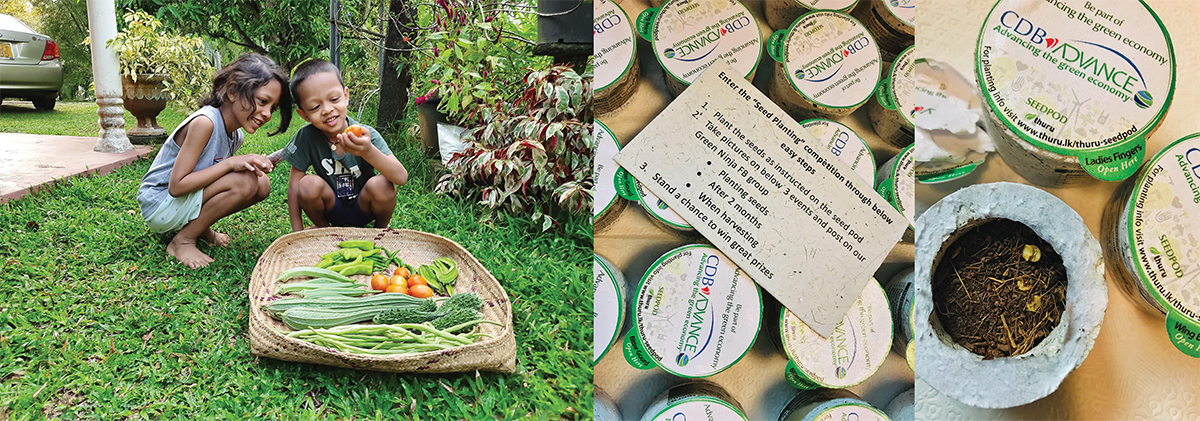
Green communication and Green networking platforms
We understand the importance of creating awareness amongst our staff members about environmental challenges faced by the world. Therefore, we educate our staff members on issues of concern; promote action by creating awareness and encouraging them to be a part of the solution by understanding the problem. We believe environmental literacy is essential to tackle climate change, and build resilient communities.
In this context, we circulate the CDB Advance e-newsletter and e-flyers to all our staff members through internal announcements, Green Ninja FB group and WhatsApp group in an effort to raise awareness, encourage green communication, knowledge sharing and keep our staff updated on latest and important information on environmental issues and how they could become a solution to the issues. Moreover, international days are celebrated to create awareness and to take actions on the respective subject matter by sharing posts, quizzes, educational videos, documentaries, statistic and facts through our Green Ninja FB group.
Induction presentation on sustainability to ensure all our new team members are aligned with the Company’s sustainability initiatives, and inculcate a sustainability led culture and mindset within them. Further, we are in the process of developing a sustainability module to educate and inspire all our team members.
Eliminate all forms of waste
We maintain waste disposal records at the head office for better management and disposal of waste. We also educate our team to reduce waste in general, including food waste, paper waste to instill a mindset of responsible waste management, which is crucial in reducing our environment footprint. Further, our conservation wheel showcase the environmental friendly measures implemented across our Company to reduce waste
Conservation wheel
GRI 306-2
This showcases the environmental friendly measures implemented across our Company to reduce our carbon footprint, waste generation and water and energy consumption by applying the concepts – reduce, reuse, repair, replace, recycle and refuse and reject.
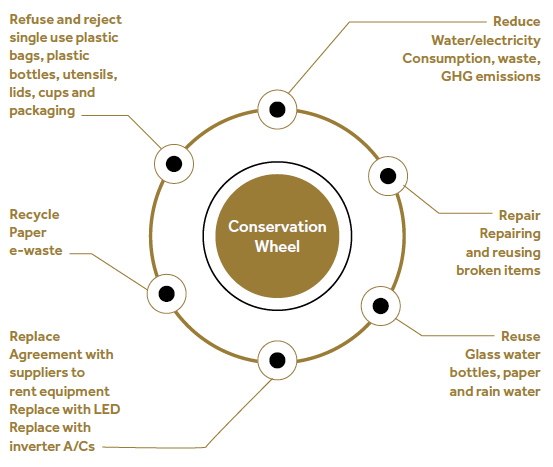
Carbon management at CDB
GRI 305-1, 305-4, 305-5
In our efforts to become a carbon neutral entity, we embarked on the carbon footprint calculation journey in the year 2015, enabling CDB to be recognised as the first ISO 14064-1 carbon verified financial institution in South Asia by Sri Lanka Carbon Fund in 2015/16. Our efforts continued and we are a Carbon verified company for the sixth consecutive year and certified as a Carbon Neutral business entity. We have invested in United Nations Certified Emission Reductions (CERs) in a Clean energy project of Installing wind power project in Rajasthan and Tamil Nadu by Wind Urja India Private Limited, registered under UN Clean Development Mechanism.
Carbon reporting enables us to analyse, assess and manage all resulting greenhouse gas (GHG) emissions as result of our business operations, track the progress of energy reduction schemes and optimise our energy consumption. Our total carbon emission for the FY 2020/21 was 2,384 tCO2e, which was 13.62% less than the previous year’s level of 2,760 tCO2e.
Carbon footprint was calculated from January to December 2020
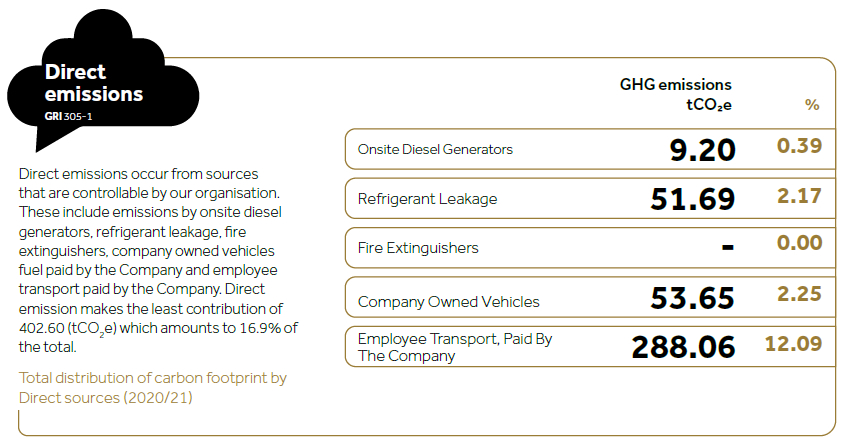
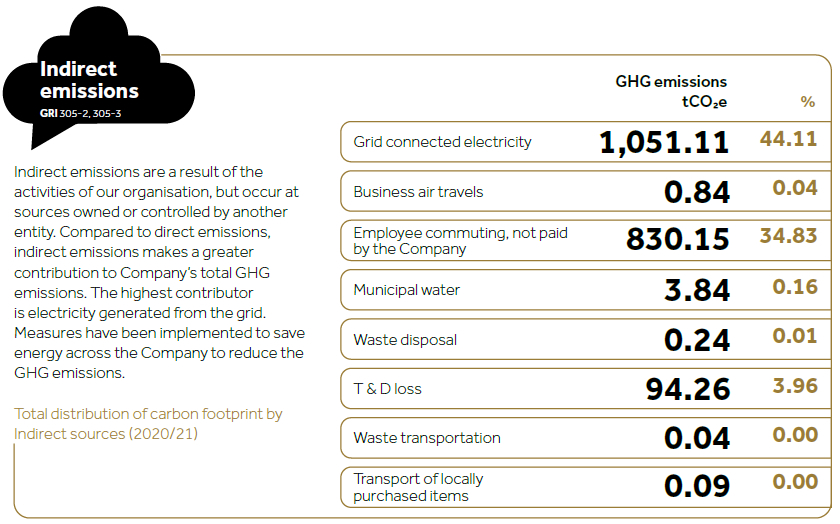
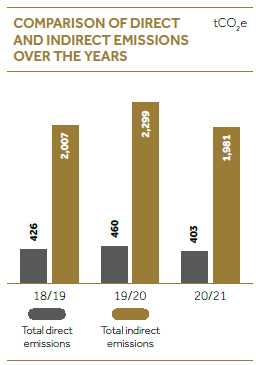
| Category | Emission source | 2019/20 | 2020/21 |
| Direct | Stand-by diesel generators - Onsite diesel generators | 12.09 | |
| Refrigerant leakage | 50.14 | ||
| Fire extinguishers | 0.007 | ||
| Company owned vehicles-Owned vehicles – fuel paid by CDB | 60.96 | ||
| Employee commuting- – fuel paid by CDB | 336.77 | ||
| Indirect | Grid connected electricity | 1,388.40 | |
| Business travel of employees via air | 43.03 | ||
| Employee commuting, - Not paid by the Company | 736.17 | ||
| Municipal water | 4.68 | ||
| Waste disposal | 0.48 | ||
| Transmission and distribution loss | 126.33 | ||
| Waste transportation | 0.09 | ||
| Transport of locally purchased items | 0.16 | ||
| Total | 2,760 |
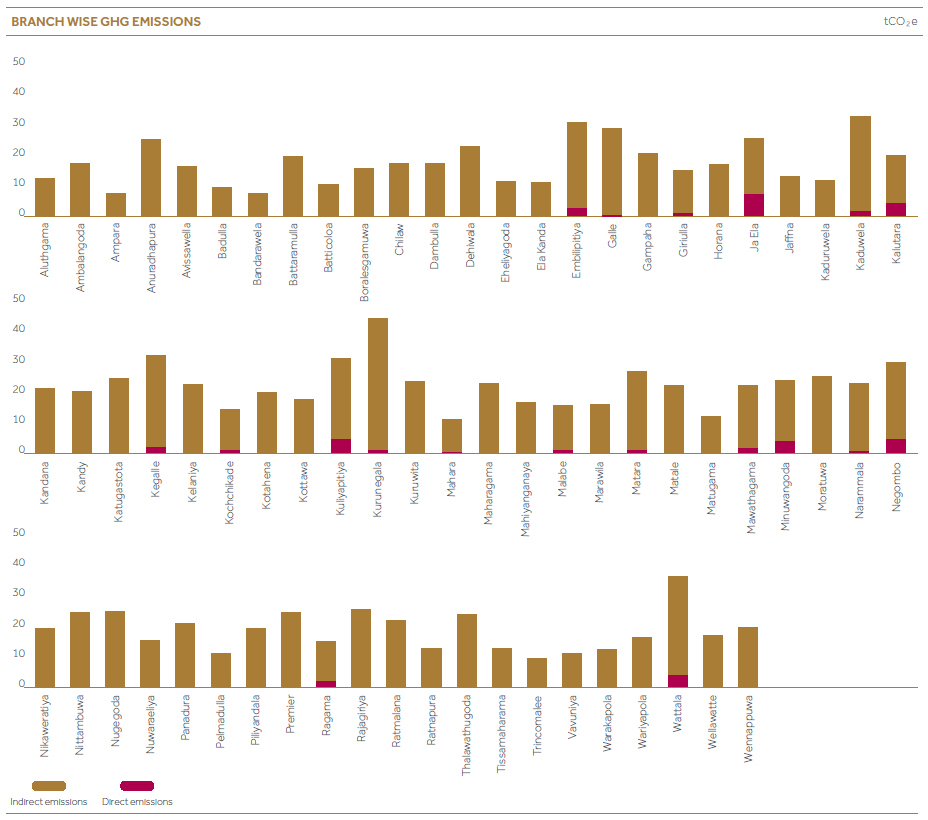
Our carbon footprint
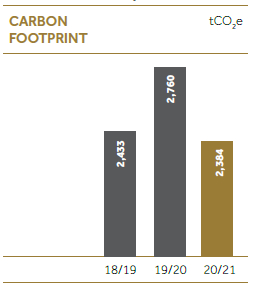
Energy management
GRI 302-1, 302-4, 302-5
As per the annual carbon footprint analysis of CDB, we monitor and report the amount of energy produced, purchased and consumed, according to source. The energy consumption for FY 2020/21 was 2.24 Mn. kWh., which was 5.7% less than the previous year’s energy consumption.
The following measures are adopted to reduce our energy consumption:
- Collaborating with suppliers and peers to reduce energy consumption, setting energy efficiency standards, adopting cost-effective standards of technologies and promoting energy efficiency through regular “Energy Audits”.
- Tracking and reporting energy usage, reduction and intensity over time and continuously striving to reduce energy consumption in our own operations, including using efficient lighting and efficient electrical appliances as a compulsory requirement under annual CDB GHG emission analysis process.
- Creating awareness among our team members on energy reduction and improving energy efficiency in households through competitions.
- Embracing the green building concept that saves energy, water and natural resources and maintains the wellbeing and quality of life of people, we are in the process of converting the branches in Mawathagama, Mahiyanganaya and Moratuwa to green branches.
- Integrating into our medium-term business strategy to invest and promote household renewable energy and increase our renewable energy consumption.
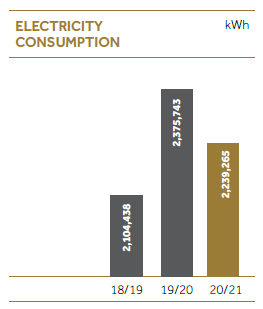
Waste management
GRI 306-1, 306-2, 306-5
We adopt the following measures to efficiently manage the waste generated in our Company.
- All CDB staff members are committed to the CDB single use plastic free pledge. Members of all divisions and branches of CDB have committed and signed the pledge on World Environment Day. As a result, we have eliminated the use of plastic water bottles and plastic food containers at all CDB events, and the use of plastics decorations across the network for any cultural or religious festival or any event.
- CDB “e-waste” and “paper waste” recycling programmes are in place to recycle waste generated in our operations responsibly and assess and prevent the actual or potential negative impact on soil, wildlife, ecosystems and the food chain.
- Providing information to team members to reduce food waste and contribute towards a sustainable environment.
- Improving environmental literacy to build a grassroots movement to achieve SDGs by sharing E-flyers and videos among all staff members.
Waste disposal during the year 2020/21
| Type of waste item | Disposal frequency | Weight (Kg) | Disposal method | |||
| Waste paper | As and when required | 878 | Waste collected from the head office is stored in the basement and sent for recycling through Green Links (Pvt) Ltd. | |||
| E-waste | As and when required | 524 | Collected as and when required and disposed through Green Links (Pvt) Ltd. | |||
| Food waste | Once in two days | 6,912 | Collected by the owner of a farm. | |||
| Damaged office equipment | Upon request by respective division/branch | Not weighed | Collected at a single location in the head office and disposed through a registered supplier. | |||
| Polythene | Daily | Not weighed | Disposed through CMC garbage disposal method. |
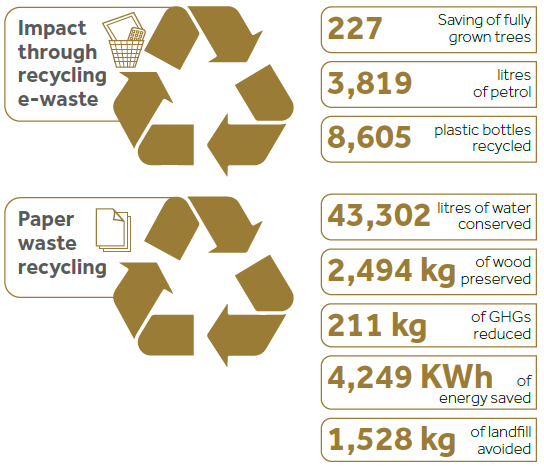
Water management
GRI 303-5, 306-5
We respect the right to safe drinking water and sanitation through availability, accessibility, acceptability and quality of water. Therefore, following measures are adopted to optimally manage our water consumption:
- Improving water performance and promoting reuse of fresh water through rainwater harvesting system for gardening purpose.
- Sharing smart solutions with peers and promoting awareness in conserving water among team members.
- World Water Day celebration and conducted competitions to create staff awareness.
- Providing safe and gender-separate toilets facilities to team members.
- Managing sanitary products, medical waste disposal and cleaning equipment storage, and providing sanitation and hygiene training to team members.
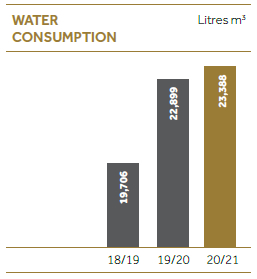
Sustainable Energy and Transport and our team members walk the talk
We have established a comprehensive set of criteria to convert our branches to green branches including increasing the level of awareness of branch team members, engagement, eliminate use of single use plastics and embracing the green building concepts that save energy, water and other resources. Currently this is conducted as a pilot project in three selected branches – Mawathagama, Mahiyanganaya and Moratuwa and the plan is to convert all our branches to green branches by 2025.
Further, we urge our team members to replicate these good practices in their homes and let them cascade to everyone around them.
During the year, we conducted a survey to inculcate a sustainability culture within the households of our team members, enabling us to find out the current use of energy efficient equipment, LED and solar energy used in their homes and their preference to use clean energy. The CDB Advance Roof solar facility was introduced, facilitating our team members to invest in a smarter and sustainable tomorrow.
We introduced “biking to work” concept, encouraging our team members who live within a radius of 10km to their reporting branch/ division to ride to work. We offered a concessionary loan scheme to purchase bikes and accessories (lights and helmet) for those who are interested.
Conservation of biodiversity
GRI 304-3
We contribute to sustainable management of forests through rehabilitating lands destroyed by human activities and committing to reduce deforestation of degraded landscapes. This is exemplified through our commitment to restore one acre of Wilpattu forest reserve in collaboration with the “Thuruliya Wenuwen Api” national tree planting project and through the Life project which is our main conservation project. The Life project includes restoring one hectare of a degraded land in Halgahawala, Opatha, adjacent to Kanneliya rain forest over a period of five years. The restoration program has a high survival rate as it includes a stringent monitoring and a gap-filling plan. The development of a biodiversity credit accrual system in par with international standards enables biodiversity conservation project owners to generate accruable non-carbon credits. The partners involved in this project will be the first to earn such credits from engaging in restoration activities in Sri Lanka. The credit accruals will be recorded in a “bio register” and can be set off against the biodiversity footprint. The process will be carried out by experts in the field.
This project is done in partnership with Biodiversity Sri Lanka (BSL), the Forest Department and International Union for Conservation of Nature (IUCN) Sri Lanka and nine private sector partners. Further during the year we partnered BSL’s collaborative initiative – Life to Our Beaches, which aims to support the cleaning up and maintenance of two selected beach stretches. We will commence the project in the ensuing year, in collaboration with the Marine Environment Protection Authority (MEPA) and the Department of Samurdhi Development (DoSD), making it a truly Public-Private-People Partnership, benefitting Sri Lanka’s coastal environment as well as underprivileged coastal communities that live within the selected area.
The CDB Chief Executive Officer serves as the director of the BSL for the second consecutive year, thus setting the tone from the top for environmental conservation.
Collaborating to conserve
Over the years, we have built partnerships that add value to our conservation efforts, resource efficiency agenda and to creating awareness on conservation. We collaborate with energy providers and relevant companies to scale-up both supply and demand of renewable energy and develop a district energy system. We also collaborate with suppliers to procure clean energy, increase share of renewable energy and support new business models to deliver sustainable and renewable energy. During the year under review, we became a Signatory to the UN Global Compact Network.
Please refer the Business partner section on page 71 for the list of our sustainability partners.
Future priorities
We aim to be the leader in sustainable finance, advancing the Green Economy by 2030.
To achieve this, we will prioritise green financing, offer a renewable energy-based bundled products suite and accelerate affordable electric and hybrid mobility solutions. Under conservation and bio diversity, we will play a leading role in sustainable financing, forest conservation and preservation and landscape restoration by 2030. We will create Green Ambassadors who will be a part of the solution by creating awareness on current sustainability issues among our team members, their families, our customers and other stakeholders.


